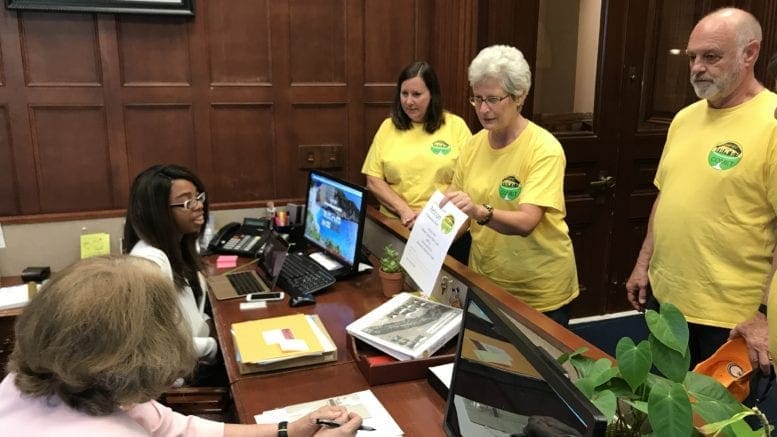The decade-long battle to extend the Silver Comet Trail into the City of Atlanta continued Wednesday morning as a group of volunteers from Connect The Comet delivered a petition to the Georgia State Capitol.
The group, led by Roberta Cook, delivered a folder with some 4,000 signatures to the office of Georgia Gov. Nathan Deal, hoping to draw attention to their efforts. While Deal did not personally accept the petition, two of his associates were on hand and it’s hoped the petition can get the expansion project, connecting the Silver Comet with the Atlanta Beltline, one step closer to reality.
“If we can get these six miles, what we’d be doing is connecting the two most significant trails in the state of Georgia,” said Cook, executive director of the River Line Historic Area and a member of Connect the Comet, who has been pushing the idea for a decade.
Cook was joined by Keith Sharp, Celeste Burr and Steve Josey to deliver the petition.
The Silver Comet Trail is one of the most popular multi-use paths in the state of Georgia. Converted from old railroad tracks once utilized by the Silver Comet train, the 61.5-mile path extends all the way from Smyrna into the state of Alabama via the Chief Ladiga Trail.
But most of the joggers, walkers and bicyclists utilizing the trail don’t realize it isn’t completed. On the Smyrna end, the trail dead ends in front of a Publix at the intersection of South Cobb Drive and the East-West Connector.
“People don’t know that the Silver Comet is not finished,” said Cook. “So, if you don’t know that it’s not finished you don’t know to ask for it.”
The original train tracks run six miles further, across I-285, the Chattahoochee River and into Atlanta. They are sparingly used and, Connect The Comet argues, would be much better served as the final piece of the multi-use trail.
“To compare, connecting the Atlanta Beltline with the Silver Comet would be like connecting I-285 with I-75,” Cook said. “Could you imagine 75 not connecting with 285? This is the same thing.”
The major obstacle has been a lack of cooperation from CSX Transportation, the owner of the railways. Laws passed when rail was king a century ago give the railroad nearly unchecked power over their own right of way. Though some portions of the needed track are almost completely hidden by overgrowth, and others have been paved over with asphalt, CSX has been far from responsive.
Cook hoped the State of Georgia would negotiate for the needed property during the last legislative session because the railroad’s lease was up for renewal. But instead, all that happened was that the legislature designated authority to the State Properties Commission.
“We’re just in limbo,” Cook said. “We didn’t want to just wait around and wait because nothing is certain, which is why we’re here today. We’d really like to get the wheels turning.”
The petition itself has been around for several years and can still be signed at ConnectTheComet.org.
The train tracks for the potential extension wind over existing bridges that cross I-285, Atlanta Road and the Chattahoochee River, meaning much of the infrastructure is already in place.
“This is the punctuation mark on several years of work,” said Steve Josey, whose business, Mark C. Pope Associates, is located near the current dead end. “The abandoned railroad tracks run through my office park. I’ve been watching rail cars parked there with kudzu growing over them and blight. We’ve looked at it — once you leave where the Silver Comet ends now you only have to cross two streets to get into intown Atlanta.”
More than 2 million people utilize the Silver Comet Trail each year, according to the Georgia Department of Transportation. Connect the Comet estimates that linking with the Beltline could double the Silver Comet’s economic impact and boost property values by 4 to 7 percent. The group has a number of major backers, including the PATH Foundation, River Line Historic Area and Mableton Improvement Coalition.
Josey previously delivered letters to both Deal and Georgia Lieutenant Gov. Casey Cagle, who is running for governor in 2018, advocating for the trail extension. But he acknowledged getting cooperation from CSX is by far the biggest obstacle.
“The most powerful companies in America for the last 150 years have probably been the railroads,” Josey said. “They’re nearly untouchable at the local level.”
